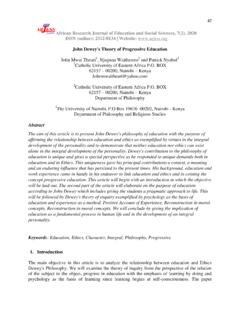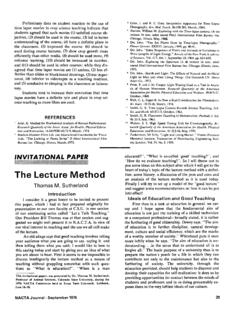Transcription of Enhancing teaching and learning of Home Economics in ...
1 Themes in Science & Technology Education, 5(1/2), 45-60, 2012 Enhancing teaching and learning of Home Economics in secondary schools with wikis: An action research study Yiu-Chi Lai, Edmund Kit-Leung Lum Department of Mathematics and Information Technology, The Hong Kong Institute of Education, Hong Kong Abstract. This article discusses an action research study using a wiki as a course platform for teaching and learning Home Economics in secondary schools. A secondary Home Economics teacher observed that dessert recipes were too wordy and that students generally felt bored and were not eager to read them in full. To improve his teaching effectiveness, the teacher attempts to investigate the use of a free wiki service (Google Sites) in order to supplement traditional classroom teaching and practice with online learning resources and activities.
2 An action research approach is adopted in the study and the teacher tries to improve his teaching strategies to enhance interactions between the participants and improve students learning outcomes. Furthermore, the teacher also attempts to integrate assessment activities with wiki-based learning activities to support students learning in his class. Keywords: Wiki, Web , Home Economics , peer assessment, self-assessment Introduction In recent years, Web concepts have led to the development and evolution of many web- based communities and hosted services, including weblogs (blogs), wikis, podcasts, Really Simple Syndication (RSS), and social networking sites (O'Reilly, 2005). Research findings show that the social aspects of Web have great potential for Enhancing education (Boyd, 2007). Looking at the wiki footprints, Lai and Ng (2011) point out that students can master various skills such as ICT, collaboration, and organizational skills through wiki-based collaborative activities and peer learning .
3 Also, in view of the rapid development of Web platforms, it is timely for teacher educators to lead schools in integrating IT into learning and teaching . This study is a response to a secondary Home Economics teacher s observation that dessert recipes were too wordy, meaning that his students were generally bored and reluctant to read them properly, which forced the teacher to spend a lot of time describing the procedure in class. To improve teaching effectiveness, the teacher attempted to use free wikis to supplement traditional classroom teaching and practice in making western desserts and pastries with online learning resources and activities. He used Google Sites, which is a free service provided by Google recommended by many technology writers as a tool for building collaborative websites for teaching and learning . An action research approach was adopted and the teacher tried to enhance interactions between participants and improve students learning outcomes.
4 Furthermore, the teacher also attempted to integrate assessment activities with the wiki-based learning activities to support students learning in his class. 46 Lai, Lum Literature review The policy document Information Technology (IT) for learning in a New Era: Five-Year Strategy 1998/99 to 2002/03 was published in Hong Kong in November 1998, marking the beginning of the first phase of the structured development of IT in education. Ten years later, in the third phase of the program, the focus was changed to emphasize the human factor rather than the technical factor (Education Bureau, 2007). Meanwhile, Web concepts have led to the development and evolution of many web- based communities and hosted services, including weblogs (blogs), wikis, podcasts, RSS, and social networking sites. Barlow (2008) points out that Web tools provide a huge and untapped resource for educators and thus offer an exciting opportunity to create a classroom without walls.
5 McLoughlin and Lee (2007) argue that users of Web not only create and own data, but also mix, amend, and recombine content. Furthermore, Boyd (2007) claims that the social aspects of Web tools have great potential for Enhancing education, while Klamma et al. (2007) suggest that Web concepts and technologies could support lifelong learning communities. Among popular Web tools, wikis facilitate the publishing of users products on the internet (Heafner & Friedman, 2008). Wikis editing and history features are particularly helpful for tracing the content and timing of revisions. A number of studies have confirmed that wikis can foster collaborative learning , particularly in the area of primary- to university- level written English (Wang, 2010). Wikis are also useful for fostering a deep understanding of social studies (Heafner & Friedman, 2008) and helping pre-service teachers to produce high-quality science materials (Nicholas & Ng, 2009).
6 Lai and Ng (2011) argue that wiki- based activities are effective in developing student teachers abilities. The results of their empirical study on the applications of Web in teacher education show the potential of using wikis to develop student teachers knowledge and skills in several areas: IT, organization, collaboration, knowledge of subject content, knowledge of pedagogy, and assessment skills. They also point out that the effectiveness of learning and teaching is greatly influenced by a Web environment and active participation. In contrast, Wheeler, Yeomans, and Wheeler (2008) report that students are frustrated by the complex structure of wikis and apprehensive about their openness and the high level of participation required. This shows us that there are drawbacks to using Web tools in education. Nevertheless, the visibility and user friendliness of wikis can foster student- centered learning and self- and peer assessment in the class (Ng & Lai, 2012).
7 In addition, Macdonald, Weller, and Mason (2002) suggest that [n]etworking opens up possibilities for Enhancing formative feedback to students through peer review, when scripts are posted electronically for comment and review (p. 10). Indeed, the effectiveness of conducting peer assessments online has been examined in detail and subsequently analyzed and confirmed by various studies (Buchanan, 2000; Kwok & Ma, 1999). Ansarimoghaddam et al. (2012) point out that wikis are increasingly gaining popularity in language learning . They reviewed the findings of empirical research studies conducted on the application of wikis in collaborative writing between 2005 and 2011 and concluded that wikis provide an interesting collaborative writing platform for the online community and are a useful and effective tool for the improvement of students writing skills.
8 They also reported that the usefulness of wikis for peer collaboration and peer assessment were realized in the reviewed studies, and that a high percentage of students perceived the use of a wiki-based collaborative writing environment positively. learning and assessment have traditionally been treated as two separate issues, the latter conducted after the former to evaluate what learners have absorbed and thus enable Enhancing teaching and learning of Home Economics in secondary schools with wikis 47 instructors to accurately rank their ability. However, recent studies have shown that assessment should be designed to support learning rather than to select learners, and be embedded in the learning process with formative feedback (Biggs, 1996; Black et al., 2003, 2004; Morris, 1995). Berry (2008) suggests that assessment should be used to promote, induce, and reinforce learning .
9 Peer assessment is recognized as a meaningful process for fostering learning effectiveness and developing learners sense of ownership (Orsmond et al., 2000). Furthermore, well-constructed self-assessment and peer assessment exercises have the potential to provide valuable learning experiences and encourage lifelong learning (Berry, 2008). Methodology The present study was conducted in a Hong Kong secondary school. The teacher used Google Sites to develop a course wiki to supplement traditional classroom teaching . Thomas (2011) writes that this free wiki service allowed him to quickly build a collaborative classroom website which could be used by both students and teachers to communicate freely and instantaneously. Oakley (2012) suggests that this service is also one of the seven best services for business collaboration and teams, and that Google s website builder allows people without any knowledge of HTML or web design to create relatively simple sites quickly and easily.
10 He also mentions that many users can view, or collaborate to edit, the content a Google site. Access to a site can be restricted to small or large groups, which is very helpful if you are working on a project either internally or involving external people. Furthermore, other Google services such as Google Groups, Google Calendar, and Google docs can easily be added to the site. The present study adopted an action research approach consisting of three research cycles. Action research has frequently been advocated as a means of engendering reflective practice and promoting educational change. It also represents inquiry that is systematic, intentional, collaborative, and democratic in intent and process (Price, 2001). Action research affirms the professionalism of teaching by giving teachers a real voice in their own professional development.















